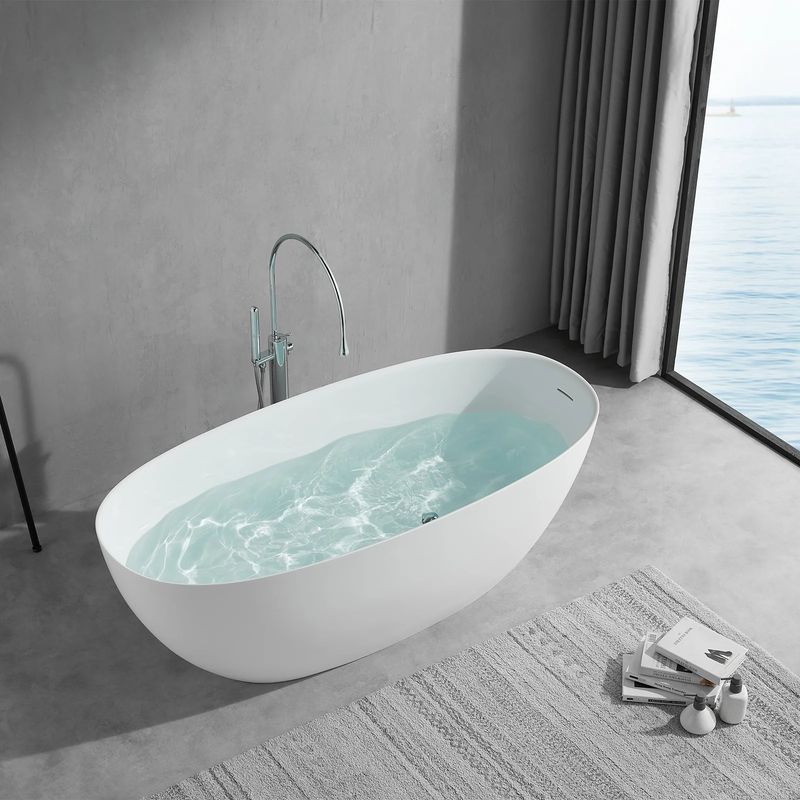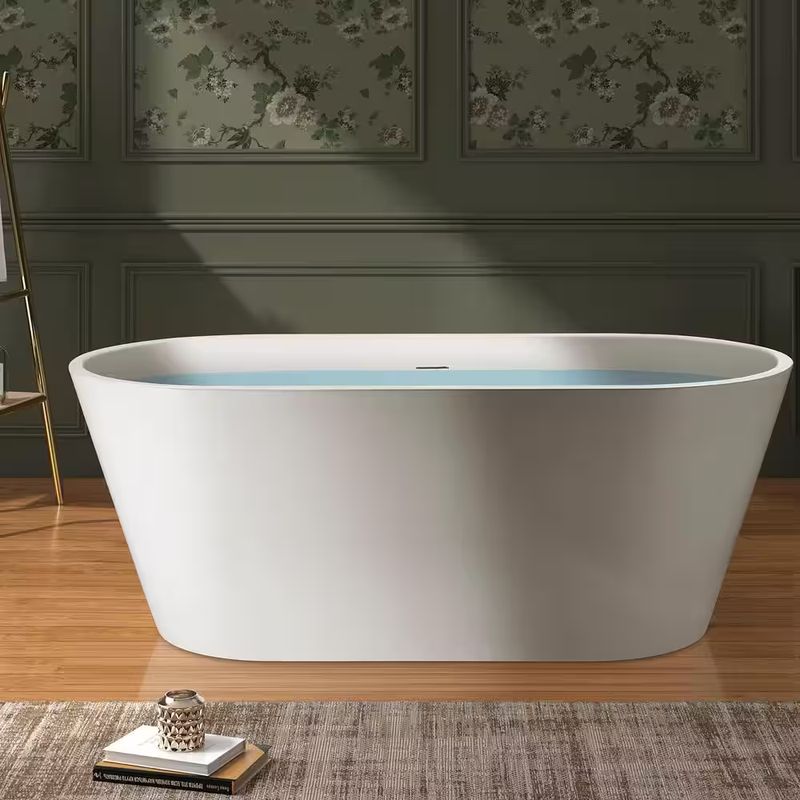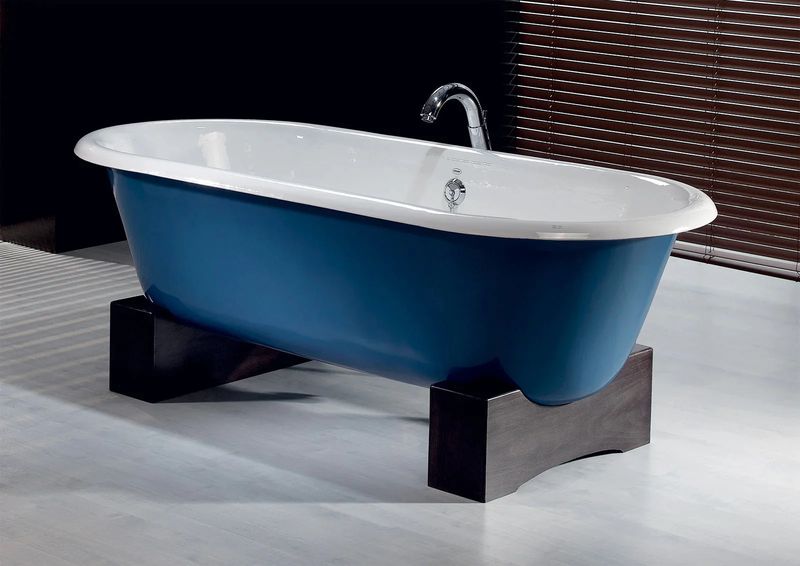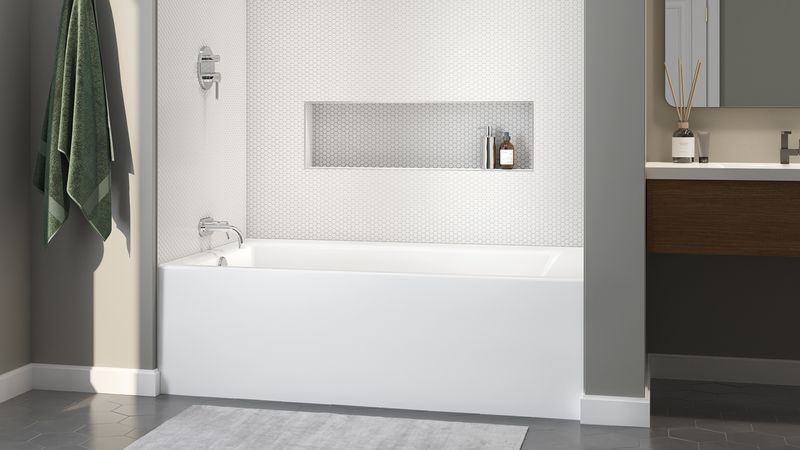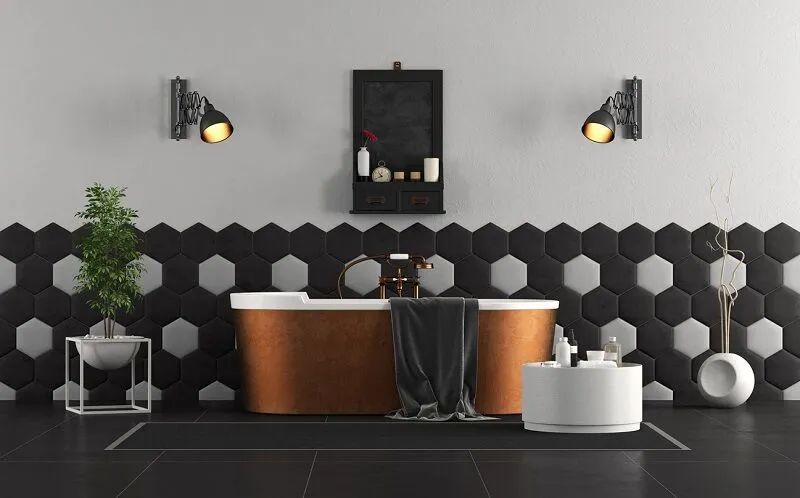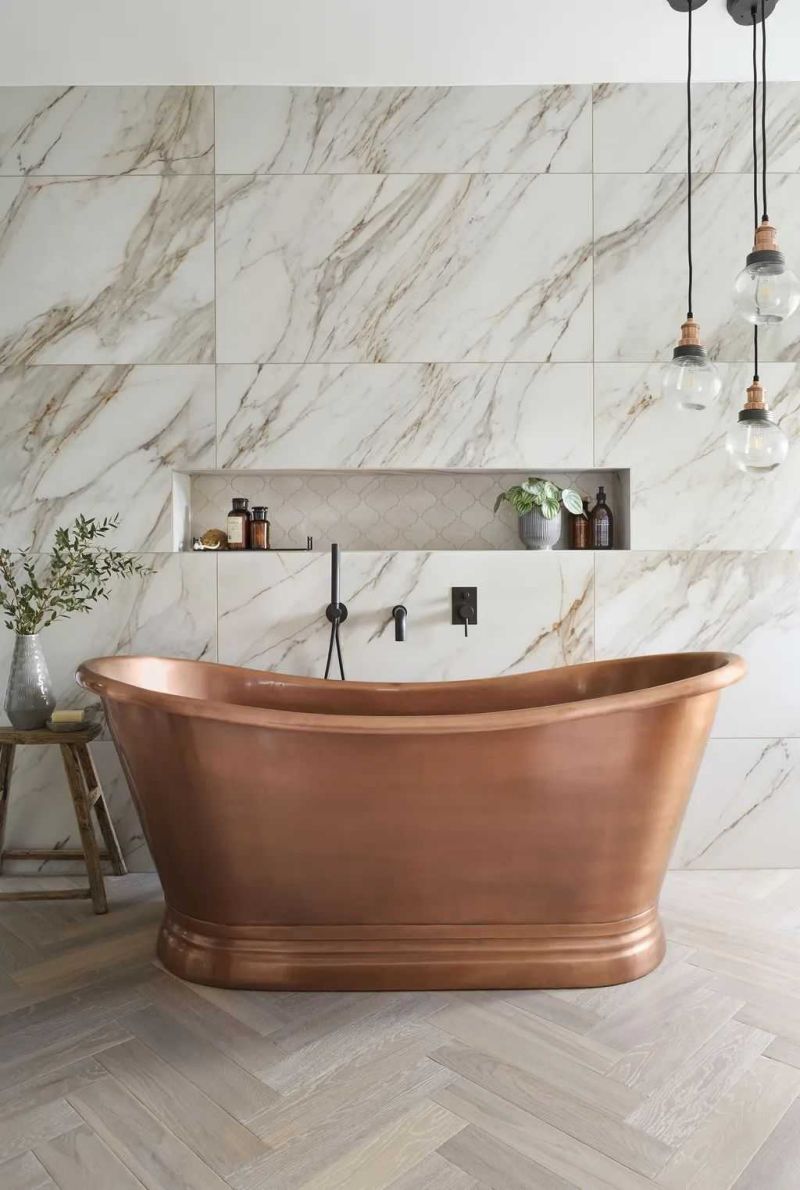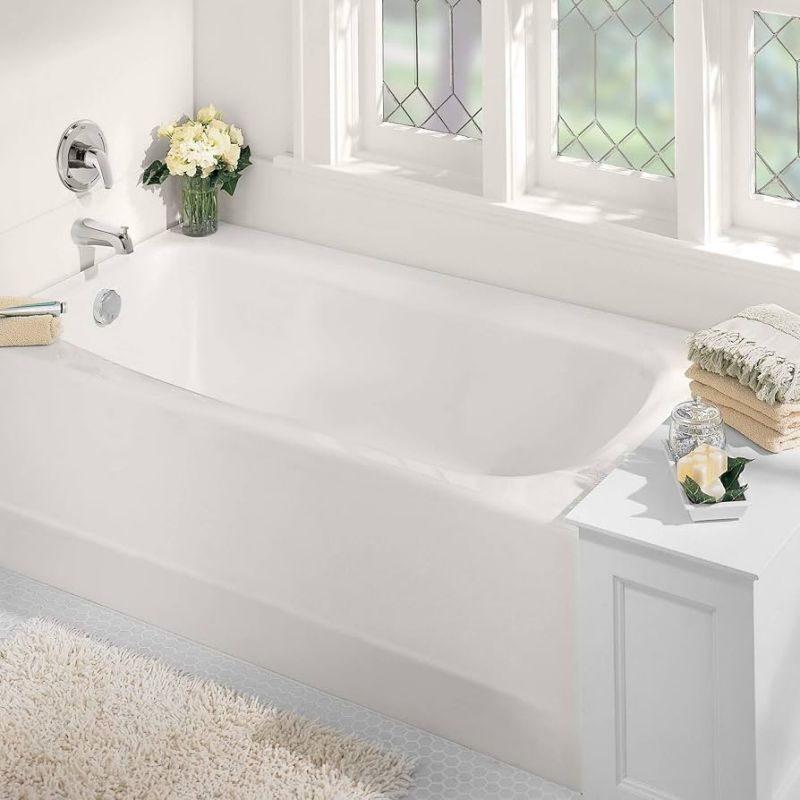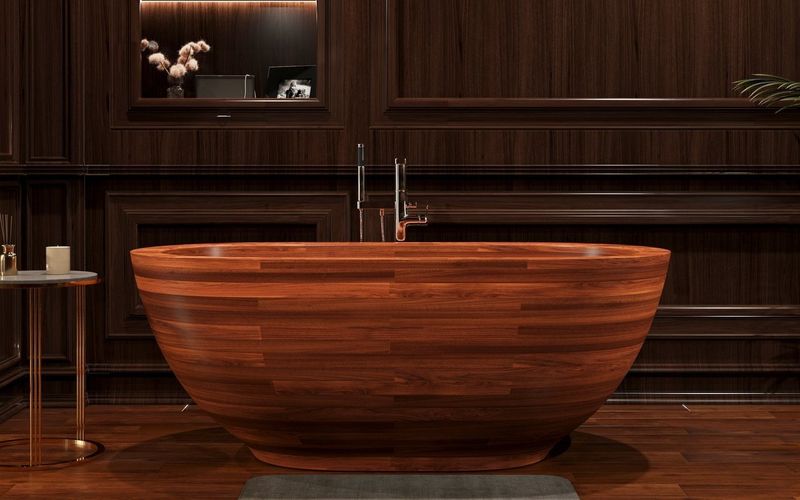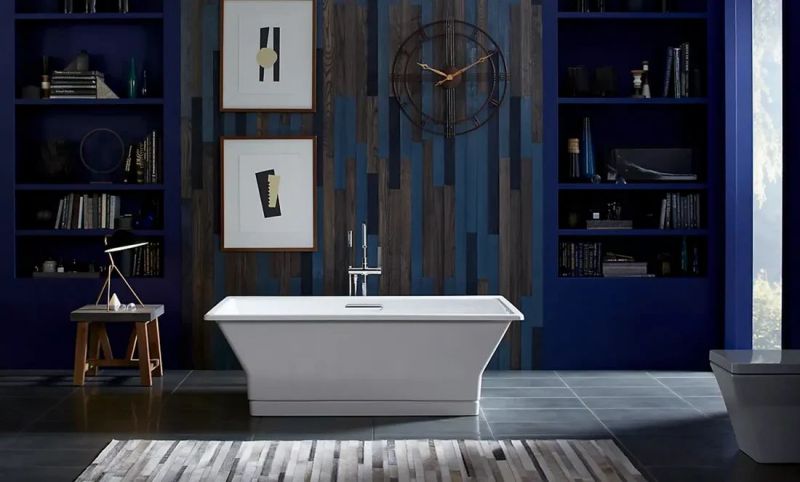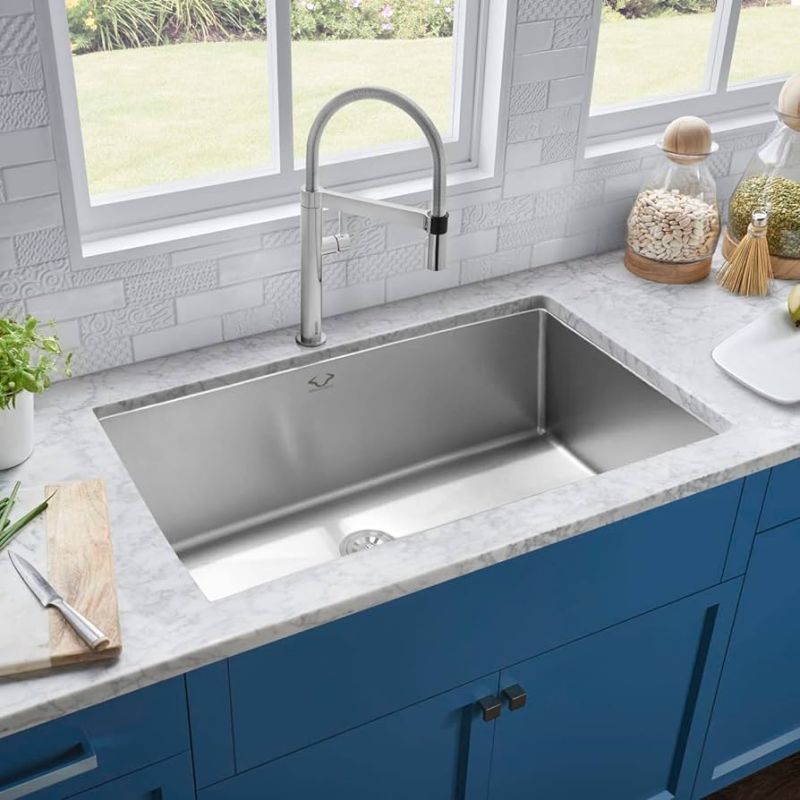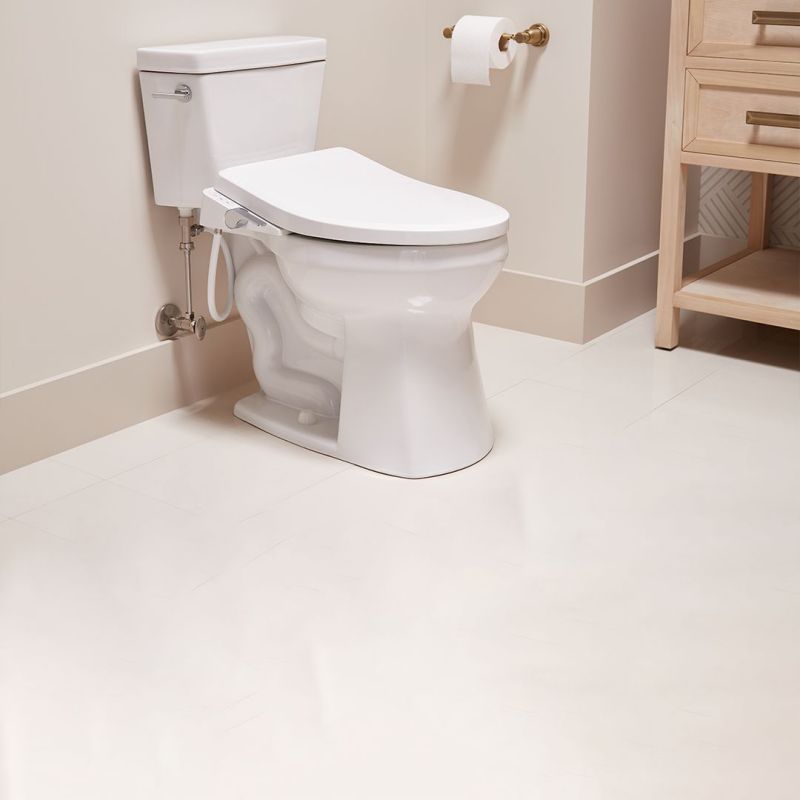 English
English
Jabra Sanitary is a sanitaryware supplier offering toilets, sinks, faucets, bathtubs, etc., at competitive prices. If you're a distributor, wholesaler, or project contractor, get a quote today!
 $23.9 Limited-time Offer
$23.9 Limited-time Offer Consignment Policy
Consignment Policy 20 Years of Experience
20 Years of Experience
Buying a bathtub can be overwhelming because there's so much to consider—bathtub materials, dimensions, and shapes. The bathtub materials is very important for how long the bathtub will last and what it will look like, as well as whether or not it will be able to keep heat and all things you should consider with your budget in mind.
Whether you are in search of budget friendly or the ultra luxurious, by knowing what material are tubs made of can help any consumer make an informed decision. That's why we decided to create this guide, which will include bathtub material comparison (you'll figure out what is best bathtub material) in addition how to find those that meet your needs.
Table of Contents
What Are Bathtubs Commonly Made Of?
Popular Bathtub Materials
Things to Consider When Choosing the Best Bathtub Materials
Comparison of Bathtub Materials
Frequently Asked Questions
Final Thoughts
Bathtubs come in a variety of materials, each with its own set of benefits and drawbacks. If you're on a budget, options like ceramics and plastics such as fiberglass offer affordable solutions.
These materials are relatively durable, with good heat retention, though they can be porous and more challenging to clean over time. For those wondering what is the best bathtub material for their needs, budget-friendly choices like fiberglass or ceramic tubs may be ideal for low cost bathtubs that still offer durability.
On the other end of the spectrum, more premium materials like stone resin and enamel-coated cast iron provide excellent durability, ease of cleaning, and heat retention.
Cast iron bathtubs, known for their longevity, are made by pouring molten iron into a shaped mold, offering an almost indestructible option that holds heat exceptionally well. If you're asking, "what type of bathtub material is best?" Cast iron is often considered the most durable bathtub material for long-term use.
When selecting the perfect bathtub for your home, it's essential to consider the material as it impacts the tub's appearance, durability, and functionality. Each bathtub material offers its unique advantages and disadvantages, ranging from cost-effective options to high-end luxurious finishes.
Below, we'll explore the most popular bathtub materials and break down what makes each one stand out. Whether you're looking for affordability, longevity, or aesthetic appeal, there is a material to suit your needs. Here's a detailed look at the most common choices available.
Acrylic Bathtub
Acrylic bathtubs are made from sheets of acrylic, a type of plastic that is lightweight, durable, and easy to mold into various shapes and sizes. These bathtubs are known for their smooth, glossy finish, which is available in a wide range of colors.
Acrylic tubs are popular for their affordability, resistance to chipping and cracking, and ease of installation like this small freestanding tub. They also offer good heat retention, making them a comfortable choice for long soaks and are often considered one of the best materials for bathtubs for those on a budget.
- Aesthetics: Glossy, smooth finish available in many colors.
- Weight: Lightweight, making it easy to install.
- Cost: Moderate pricing, making it affordable for most homeowners.
- Durability: Reasonably durable, but can scratch easily.
- Heat Retention: Excellent heat retention.
- Maintenance: Easy to clean but prone to scratches
Fiberglass Bathtub
Fiberglass bathtubs are constructed from reinforced plastic and are among the most cost-effective options on the market. They are lightweight and easy to install, making them a popular choice for budget-conscious homeowners.
While fiberglass tubs are not as durable as some other materials, they are easy to repair and replace, and their smooth finish can be refinished if it becomes worn or damaged. Fiberglass is frequently mentioned in bathtub material comparison guides as a great low-cost solution with decent performance.
- Aesthetics: Less glossy than acrylic, but available in various colors.
- Weight: Very lightweight, easy to install.
- Cost: One of the most affordable bathtub materials.
- Durability: Less durable, can crack or fade over time.
- Heat Retention: Decent but not as good as acrylic.
- Maintenance: Easy to clean but requires frequent maintenance.
Cast Iron Bathtub
Cast iron bathtubs are made by pouring molten iron into a mold, then coating the iron with a layer of enamel. These tubs are incredibly durable and heavy, offering excellent heat retention and a classic, timeless aesthetic. Cast iron tubs are resistant to scratching, chipping, and denting, making them a long-lasting investment.
However, their weight requires reinforced flooring and professional installation. Many people regard cast iron as the best material for a bathtub, especially when searching for the best soaking tub material due to its heat retention capabilities.
- Aesthetics: Timeless, luxurious appearance.
- Weight: Extremely heavy, making installation more difficult.
- Cost: High-end, expensive option.
- Durability: The most durable material available, resistant to dents and scratches.
- Heat Retention: Excellent, stays warm for long periods.
- Maintenance: Easy to clean and maintain
Porcelain Bathtub
Porcelain bathtubs are typically made of cast iron or steel, coated with a layer of porcelain enamel. These tubs combine the durability of metal with the elegant, glossy finish of porcelain.
Porcelain bathtubs are resistant to scratching and staining, although the enamel can chip if struck with a heavy object. They offer a classic look and are often found in older homes or those seeking a traditional style. Porcelain enameled steel bathtubs are another option, providing a cost-effective and durable bathtub solution.
- Aesthetics: Classic and elegant with a glossy finish.
- Weight: Heavier than acrylic and fiberglass but lighter than cast iron.
- Cost: Mid-range pricing, depending on the base material.
- Durability: Durable but can chip if something heavy is dropped.
- Heat Retention: Excellent.
- Maintenance: Easy to clean, but chipped enamel can lead to rust.
Ceramic Bathtub
Ceramic bathtubs are made from molded ceramic clay, which is then fired at high temperatures to create a hard, durable surface. These tubs are usually finished with a glaze that provides a smooth, waterproof surface.
Ceramic bathtubs are highly customizable, allowing for intricate designs and colors. However, they are heavy and require careful installation to prevent cracking or chipping. If you're looking for a ceramic tub, it's important to balance style with practicality.
- Aesthetics: Available in various styles but often used for a custom look.
- Weight: Fairly heavy.
- Cost: Moderate to high, depending on customization.
- Durability: Can crack under heavy impact but is otherwise durable.
- Heat Retention: Good.
- Maintenance: Can be hard to clean due to grout lines.
Copper Bathtub
Copper bathtubs are handcrafted from sheets of pure copper, often hammered for texture. These tubs are known for their unique, luxurious appearance and excellent heat retention. Over time, copper develops a natural patina, which can enhance its aesthetic appeal.
Copper bathtubs are also naturally resistant to mold and bacteria, making them a hygienic choice. However, they require specific maintenance to preserve their finish. Many soaking tub manufacturers like Jabra Sanitary offer copper as the best tub material for those seeking luxury and durability.
- Aesthetics: Rustic, antique look with a beautiful patina.
- Weight: Moderately heavy.
- Cost: Very expensive.
- Durability: Extremely durable and rust-resistant.
- Heat Retention: Excellent, retains heat for long periods.
- Maintenance: Requires regular polishing to maintain its shine.
Stone Resin Bathtub
Stone resin bathtubs are made from a blend of crushed stone and resin, offering the luxurious look of natural stone without the excessive weight. These tubs are durable, non-porous, and offer excellent heat retention.
Stone resin tubs are often chosen for their modern, minimalist aesthetic, and they come in a variety of finishes that mimic the appearance of marble, granite, or other natural stones. For those seeking the best material for a tub with a natural stone finish, stone resin is an excellent choice.
- Aesthetics: Luxurious, natural stone appearance.
- Weight: Lighter than real stone but still quite heavy.
- Cost: High-end pricing.
- Durability: Very durable and scratch-resistant.
- Heat Retention: Excellent heat retention.
- Maintenance: Easy to clean and maintain.
Cast Polymer Bathtub (Cultured Marble, Granite, or Onyx)
Cast polymer bathtubs are made from a blend of natural stone particles and resins, which are molded and finished with a gel coat. These tubs can mimic the appearance of natural marble, granite, or onyx at a more affordable price point.
They are durable, non-porous, and resistant to staining and scratching. Cast polymer tubs are often used in luxury bathrooms for their high-end look and customizable finishes, making them one of the best bath tub materials for creating a premium appearance.
- Aesthetics: Mimics the look of natural stone.
- Weight: Moderate.
- Cost: Mid- to high-end pricing.
- Durability: Durable but can crack under heavy impact.
- Heat Retention: Good heat retention.
- Maintenance: Requires regular cleaning to maintain appearance
Enameled Steel Bathtub
Enameled steel bathtubs are made by coating a steel shell or steel plate with a layer of porcelain enamel. These tubs offer a similar appearance to cast iron but at a lower cost and weight. Enameled steel bathtubs are durable, resistant to scratching and chipping, and relatively easy to clean.
However, they do not retain heat as well as cast iron, and the enamel can chip over time. If you're wondering what those hotel bathtubs are made out of, enameled steel is often a common choice for durability and affordability.
- Aesthetics: Glossy, smooth finish.
- Weight: Lighter than cast iron, but still heavy.
- Cost: Mid-range pricing.
- Durability: Less durable than cast iron, can chip easily.
- Heat Retention: Good.
- Maintenance: Easy to clean but prone to chipping.
Wood Bathtub
Wood bathtubs are crafted from solid wood, often using traditional Japanese techniques. These tubs offer a warm, natural aesthetic that is unique and luxurious. Wood bathtubs are often made from water-resistant woods like cedar or teak, which can withstand moisture and resist decay.
However, they require regular maintenance, including sealing and careful cleaning, to prevent water damage and maintain their beauty. Wood is a less common but beautiful choice for those who want the best material for a bath tub with a unique style.
- Aesthetics: Unique, natural wood appearance.
- Weight: Heavy.
- Cost: Very expensive.
- Durability: Requires careful maintenance to prevent water damage.
- Heat Retention: Excellent.
- Maintenance: Requires frequent care to prevent mold and rot.
Things to Consider When Choosing the Best Bathtub Materials
Selecting the best bathtub material goes beyond just aesthetics. Several factors play a significant role in determining which material is the right fit for your bathroom. From durability and cost to heat retention and ease of maintenance, understanding how each material performs in different areas is crucial.
Your choice should balance your budget, lifestyle, and the specific needs of your bathroom space. This section will guide you through the essential aspects to consider when choosing the most suitable bathtub material for your home.
Aesthetics
The aesthetic appeal of a bathtub is crucial in defining the overall look and feel of your bathroom. Acrylic bathtubs are versatile, offering a wide range of colors and designs to suit modern and traditional settings alike.
Fiberglass tubs also come in various styles, though they tend to have a more basic appearance. Cast iron and porcelain bathtubs exude a classic charm, often seen in vintage or traditionally styled bathrooms.
Ceramic bathtubs allow for unique, customized designs, while copper tubs add a rustic, luxurious touch with their natural patina. Stone resin bathtubs bring a sleek, contemporary feel, imitating the elegance of natural stone. Cast polymer tubs provide a high-end look similar to cultured marble or granite, and wood bathtubs offer a warm, natural aesthetic that stands out in any bathroom.
Weight
Weight is an important consideration, particularly for installation and floor support. Acrylic and fiberglass bathtubs are the lightest, making them easy to maneuver and install. Enameled steel tubs are heavier but still manageable, while cast iron, stone resin, and copper bathtubs are significantly heavier, requiring reinforced flooring and professional installation.
Wood bathtubs, depending on their size and thickness, can also be quite heavy, adding to the installation complexity. The weight of the tub not only affects the ease of installation but also the type of support structure needed in your bathroom. If you're wondering, "what is the best tub material for easy installation?" lightweight options like acrylic or fiberglass might be ideal.
Cost
Bathtub costs vary widely depending on the material. Fiberglass and acrylic tubs are the most budget-friendly, offering an affordable option for most homeowners.
Enameled steel and porcelain bathtubs are moderately priced, offering a good balance between cost and durability. Cast iron, stone resin, and copper bathtubs are on the higher end of the price spectrum due to their durability and aesthetic appeal.
Cast polymer bathtubs, while not as expensive as natural stone, still command a higher price for their luxurious look. Wood bathtubs, being a niche and handcrafted option, can also be quite expensive, reflecting the craftsmanship and materials used. When searching for low cost bathtubs, consider acrylic or fiberglass for their affordability and decent durability.
Durability
Durability is a key factor in determining the lifespan of your bathtub. Cast iron bathtubs are among the most durable, resistant to chipping, scratching, and denting, and can last for decades.
Stone resin and cast polymer bathtubs also offer excellent durability, with surfaces that resist wear and tear. Acrylic bathtubs, while more affordable, can be prone to scratching and may not last as long as heavier materials.
Fiberglass tubs, although lightweight and inexpensive, are more susceptible to cracks and may require more frequent repairs or replacement. Copper bathtubs are naturally resistant to corrosion and can develop a beautiful patina over time, adding to their longevity. Wood bathtubs, although durable when properly maintained, require regular care to prevent water damage and warping. When choosing the most durable bathtub material, cast iron and stone resin are often considered top choices.
Heat Retention
Heat retention is an important consideration for those who enjoy long, warm baths. Cast iron bathtubs excel in this area, maintaining water temperature for extended periods due to their thick, heat-absorbing material.
Stone resin and copper bathtubs also offer good heat retention, making them ideal for a luxurious bathing experience. Acrylic bathtubs provide moderate heat retention, while fiberglass bathtubs tend to lose heat more quickly, requiring more frequent topping up of hot water.
Enameled steel tubs are better than fiberglass in retaining heat but fall short compared to cast iron or stone resin. If you're wondering, "what is the best material for tub heat retention?" cast iron is often recommended as the best soaking tub material for maintaining water warmth.
Maintenance and Cleaning
Maintenance and ease of cleaning are important considerations for any bathtub material. Acrylic and fiberglass bathtubs are relatively easy to clean, but they can be scratched by abrasive cleaners, requiring gentle cleaning products.
Cast iron and porcelain bathtubs are durable and resistant to most cleaning agents, making them low-maintenance options. Copper bathtubs develop a natural patina that requires specific care to maintain, while wood bathtubs need regular sealing and cleaning to prevent water damage.
Stone resin and cast polymer bathtubs are also easy to clean, with non-porous surfaces that resist staining and bacteria growth. If you're concerned about keeping your tub in top shape, the best bath tub material for easy cleaning might be acrylic or porcelain.
Comparison of Bathtub Materials
| Material | Aesthetics | Weight | Cost | Durability | Heat Retention | Maintenance and Cleaning | Installation |
|---|---|---|---|---|---|---|---|
| Acrylic | Versatile, available in various colors and designs. | Lightweight | Affordable | Moderately durable, can scratch but easy to repair. | Moderate heat retention | Easy to clean but can scratch; use non-abrasive cleaners. | Easy to install, DIY-friendly. |
| Fiberglass | Basic appearance, available in various styles. | Very lightweight | Most affordable | Less durable, prone to cracking but easy to repair. | Poor heat retention, cools down quickly. | Easy to clean but prone to scratching and cracking. | Very easy to install, ideal for DIY. |
| Cast Iron | Classic, timeless appearance, often found in vintage settings. | Very heavy | Expensive | Extremely durable, resistant to chipping, scratching, and denting. | Excellent heat retention, keeps water warm for longer periods. | Low maintenance, resistant to most cleaners. | Requires professional installation due to weight. |
| Porcelain | Elegant, glossy finish, often used in traditional bathrooms. | Heavy | Moderately expensive | Durable but the enamel can chip if hit with a heavy object. | Good heat retention, better than fiberglass but less than cast iron. | Easy to clean, but chipped enamel may need professional repair. | Requires reinforced flooring and professional installation. |
| Ceramic | Highly customizable with intricate designs and colors. | Heavy | Expensive | Durable but can crack or chip if not installed correctly. | Good heat retention, maintains warmth effectively. | Requires careful cleaning to avoid damage, can be more maintenance-intensive. | Requires professional installation and careful handling. |
| Copper | Luxurious, unique with a natural patina that develops over time. | Heavy | Very expensive | Durable, naturally resistant to corrosion and bacteria. | Excellent heat retention, stays warm for long periods. | Requires specific maintenance to preserve the finish; patina needs care. | Requires professional installation and reinforced flooring. |
| Stone Resin | Sleek, contemporary look, mimics natural stone. | Very heavy | Expensive | Very durable, resistant to wear and tear. | Excellent heat retention, ideal for long baths. | Easy to clean with non-porous surface, resistant to staining. | Requires professional installation due to weight. |
| Cast Polymer (Cultured Marble, Granite, or Onyx) | High-end appearance, mimics natural stone at a lower cost. | Heavy | Moderately expensive to expensive | Durable, resistant to scratches and stains. | Good heat retention, better than fiberglass but less than cast iron. | Easy to clean with a non-porous surface, requires gentle cleaners. | Requires professional installation, heavy and complex. |
| Enameled Steel | Classic, similar to cast iron but at a lower cost. | Moderate weight | Moderately affordable | Durable, but enamel can chip over time. | Moderate heat retention, better than fiberglass. | Easy to clean but enamel can chip, which may require professional repair. | Easier to install than cast iron but still may need professional help. |
| Wood | Warm, natural, unique aesthetic. | Heavy | Very expensive | Durable with proper care, requires sealing to prevent water damage. | Good heat retention, stays warm, ideal for long soaks. | High maintenance, requires regular sealing and careful cleaning. | Requires professional installation and careful handling. |
When choosing a bathtub material, consider factors like your budget, the design of your bathroom, and how much maintenance you're willing to perform. If you're looking for something affordable and easy to install, acrylic and fiberglass are great options.
For those who want a luxurious, long-lasting tub with excellent heat retention, materials like cast iron or stone resin are ideal. If you're unsure how to pick a tub, start by considering the most important factors for your lifestyle and space.
Frequently Asked Questions
1. What is the most durable bathtub?
Cast iron bathtubs are considered the most durable, withstanding heavy use and lasting for decades.
2. What is the difference between resin and acrylic bathtubs?
Resin bathtubs mimic the look of natural stone and are more durable, while acrylic is a lightweight, affordable plastic option.
3. Is my tub fiberglass or acrylic?
Fiberglass tubs have a slightly rougher surface and tend to be more porous than the smoother, glossier acrylic tubs.
4. What are bathtubs most frequently made of?
Acrylic and fiberglass are the most common bathtub materials due to their affordability and ease of installation.
5. How can I tell if my bathtub is porcelain or enamel?
Porcelain tubs are made from cast iron or steel with a thicker enamel layer, giving them a harder surface. If a magnet sticks to the surface, it's likely enamel-coated steel, as porcelain does not attract magnets.
Final Thoughts
Choosing the best bathtub material for your bathroom is a decision that balances aesthetics, cost, durability, and maintenance. Whether you're looking for the classic elegance of cast iron, the modern appeal of acrylic, or the unique luxury of copper, each material offers distinct advantages.
Consider how each material aligns with your lifestyle, budget, and design preferences. For those who prioritize heat retention and durability, cast iron or stone resin bathtubs may be ideal. If ease of installation and affordability are key, acrylic or fiberglass bathtubs might be the better choice.
Ultimately, the best materials for bathtubs like a whirlpool massage bathtub, will enhance both the functionality and the beauty of your bathroom, providing comfort and enjoyment for years to come. If you're wondering, "what is the best bathtub material?" this guide will help you find the answer.







